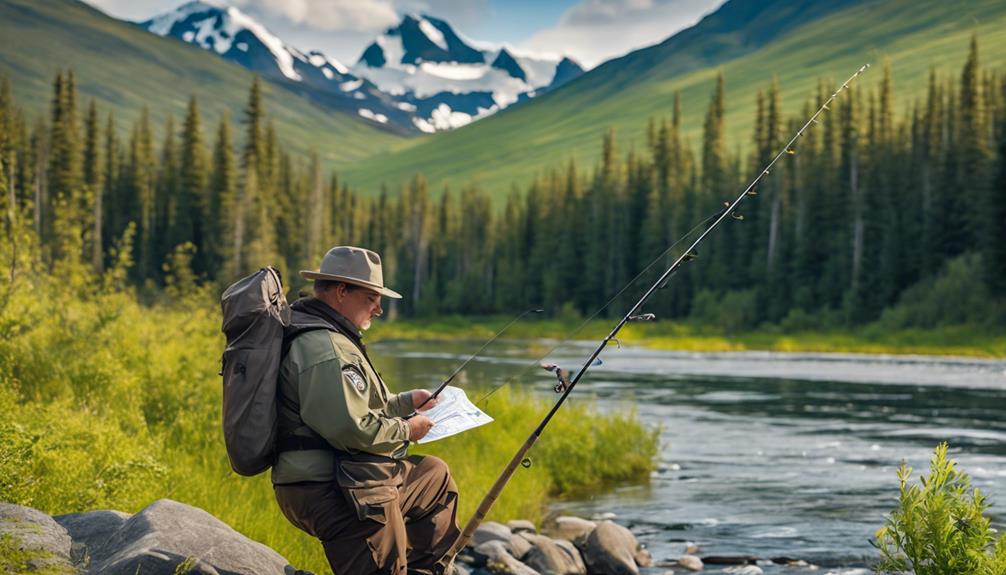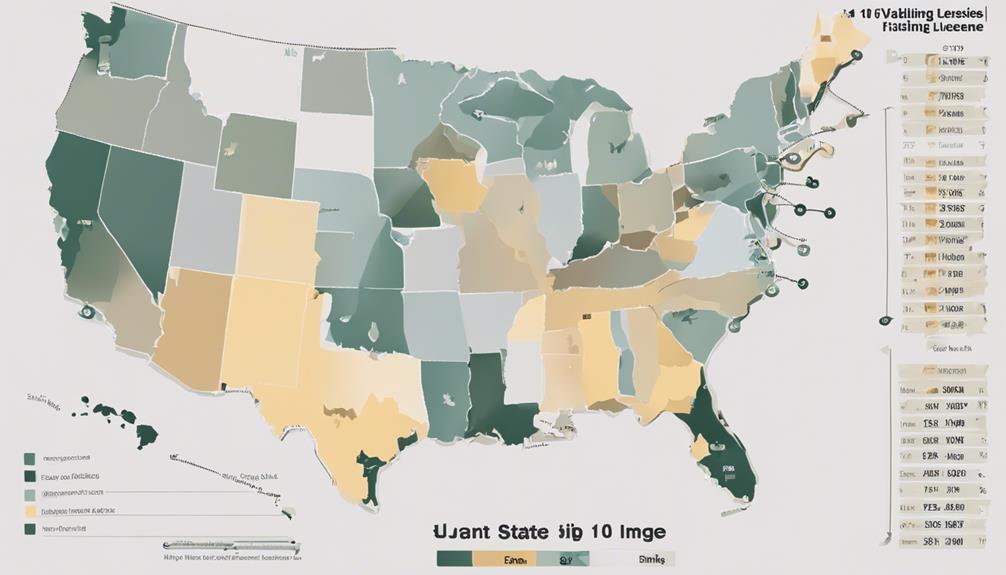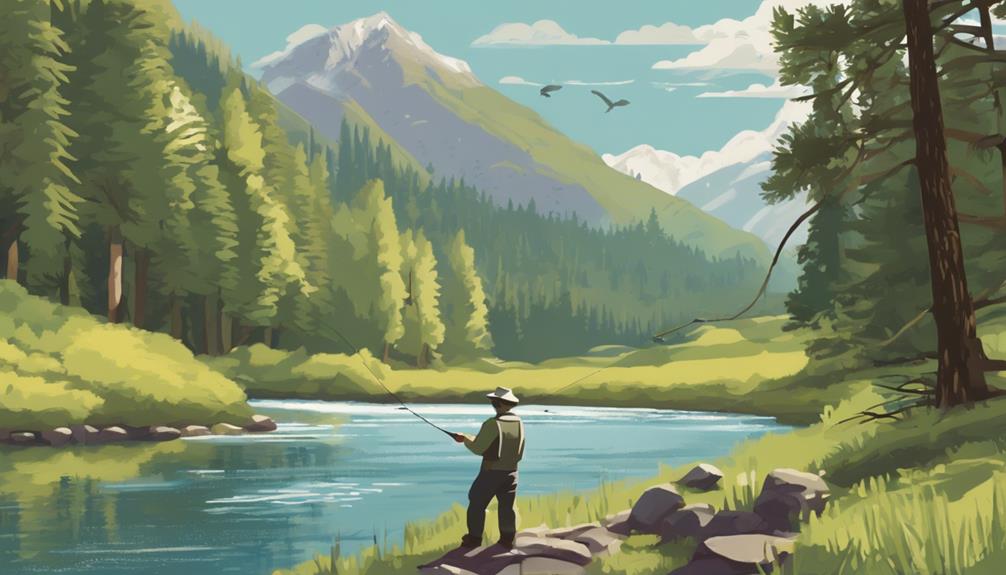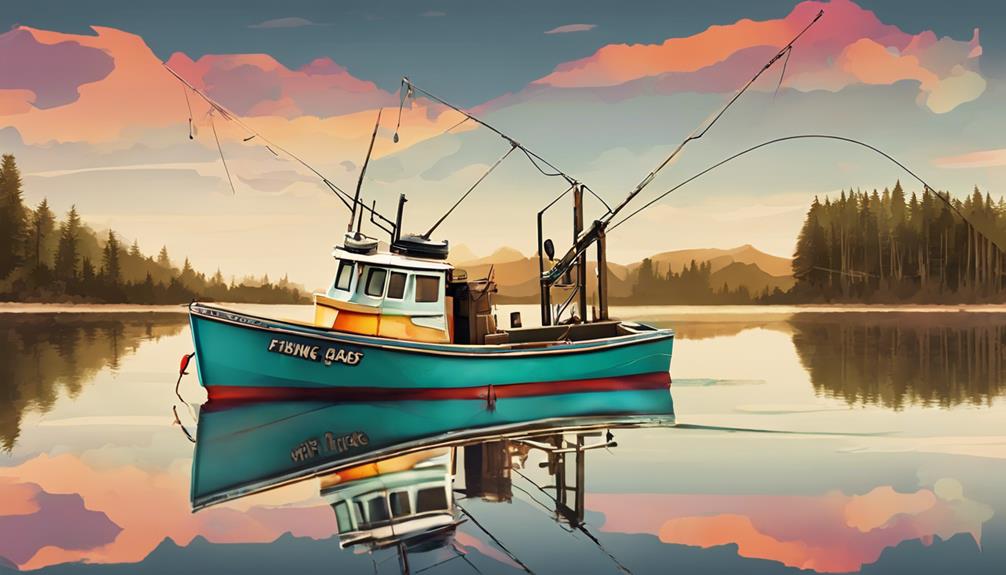When you're planning your fishing trip to Alaska, have you ever wondered why tourists need fishing licenses in the Last Frontier? The requirement may seem like a bureaucratic hassle, but understanding the rationale behind it can shed light on the importance of conservation efforts and sustainable fishing practices in this pristine environment.
Stay tuned to discover the key reasons behind this regulation and how it contributes to the preservation of Alaska's rich marine ecosystem.
Importance of Fishing Licenses in Alaska
Obtaining a fishing license in Alaska is crucial for anyone looking to enjoy the abundant fishing opportunities in the state's pristine waters. Not only does having a fishing license ensure that you're abiding by the law, but it also plays a significant role in upholding fishing ethics and minimizing your conservation impact on the delicate ecosystem.
When you purchase a fishing license, you aren't just gaining permission to fish; you're also committing to following fishing ethics. These ethics dictate how anglers should behave while fishing, emphasizing concepts such as respecting the environment, practicing proper catch and release techniques, and treating wildlife with care and consideration. By adhering to these principles, you contribute to maintaining the balance of the ecosystem and preserving the natural beauty of Alaska's waters for future generations to enjoy.
Moreover, obtaining a fishing license is a way to regulate and monitor the number of anglers in specific areas, thus minimizing the conservation impact on fish populations and their habitats. Alaska's diverse marine life is a precious resource that must be protected, and fishing licenses help fund conservation efforts and research aimed at ensuring sustainable fishing practices.
Types of Fishing Licenses Available
To explore the various types of fishing licenses available in Alaska, familiarize yourself with the options tailored to different fishing preferences and durations. When it comes to license requirements in Alaska, there are several types of fishing licenses to choose from based on your needs.
For those looking for a short-term fishing experience, a 1-day fishing license is perfect. This license allows you to enjoy a day of fishing without committing to a longer-term permit. If you plan to spend a bit more time casting your line, a 3-day or 7-day fishing license might be more suitable. These options provide flexibility for visitors with varying lengths of stay in the state.
In Alaska, fishing restrictions are in place to protect the environment and ensure sustainable fishing practices. Different licenses come with different sets of regulations, so it's crucial to be aware of the specific rules that apply to your license type. These restrictions may include limits on the type and amount of fish you can catch, as well as guidelines on where and when you can fish. By adhering to these fishing restrictions, you not only comply with the law but also contribute to the preservation of Alaska's diverse marine life.
Before embarking on your fishing adventure in Alaska, make sure to select the appropriate fishing license that aligns with your preferences and duration of stay. Understanding the license requirements and fishing restrictions will help you make the most of your experience while respecting the local wildlife and environment.
Regulations for Non-Residents
Non-residents visiting Alaska must familiarize themselves with specific fishing regulations applicable to their fishing activities. When fishing in the Last Frontier as a tourist, it's crucial to understand the following:
- License Requirements: Non-residents are required to obtain a fishing license before engaging in any fishing activities in Alaska. These licenses can typically be purchased for different durations, such as a day, a week, or even a year, depending on the visitor's length of stay and fishing plans.
- Fishing Restrictions: Non-residents need to adhere to various fishing restrictions put in place to conserve Alaska's diverse aquatic ecosystems. These restrictions may include limits on the number and size of fish that can be caught, specific areas where fishing is prohibited, and guidelines on catch-and-release practices.
- Regulations Compliance: It's essential for non-resident anglers to comply with all fishing regulations set forth by the Alaska Department of Fish and Game. This includes understanding the specific rules for different species of fish, knowing the fishing seasons for each type of fish, and being aware of any special regulations that may apply to certain locations within the state.
Cost of Fishing Licenses for Tourists
When planning your fishing trip in Alaska, understanding the cost of fishing licenses for tourists is essential. License fees for tourists in Alaska vary depending on the duration of the license and whether you're a resident of the United States. Non-resident tourists typically pay higher fees compared to residents. The prices can range from around $20 for a one-day fishing license to approximately $145 for a seven-day license. These fees help support conservation efforts and the maintenance of Alaska's abundant fisheries.
Tourist restrictions are also important to consider when purchasing a fishing license in Alaska. Non-residents are subject to specific regulations, such as bag limits and size restrictions, to ensure sustainable fishing practices. It's crucial to familiarize yourself with these restrictions to avoid any potential fines or penalties. Additionally, some areas in Alaska may have special regulations or requirements for tourists, so be sure to research the specific location where you plan to fish.
Where to Obtain Fishing Licenses
You can obtain your fishing license in Alaska at various authorized vendors throughout the state. When preparing to fish in Alaska, it's important to ensure you meet the necessary license requirements and have the proper documentation. Here are three convenient ways to get your fishing license:
- Authorized Vendors: Visit local authorized vendors such as outdoor sporting goods stores, bait shops, and some convenience stores across Alaska. These vendors are spread throughout the state, making it convenient to purchase your fishing license in person. Make sure to have your identification and any required information ready when you visit these locations.
- Alaska Department of Fish and Game Website: Utilize online options by visiting the Alaska Department of Fish and Game's website. You can easily purchase your fishing license online, especially if you prefer the convenience of obtaining it from the comfort of your own home. The website provides all the necessary information on license types, fees, and regulations.
- Mobile Apps: The Alaska Department of Fish and Game also offers mobile applications that allow you to buy and store your fishing license digitally on your smartphone. This option is ideal for travelers who prefer carrying digital copies rather than physical documents. Download the app, follow the instructions, and have your license readily available on your phone for quick and easy access while fishing in Alaska.
Conservation Efforts and Fishing Licenses
Utilizing sustainable fishing practices is essential for maintaining healthy fish populations, and obtaining a fishing license in Alaska contributes to conservation efforts. Wildlife preservation is a top priority in Alaska, where the delicate balance of ecosystems heavily relies on the responsible management of fish populations. By requiring fishing licenses, the state can monitor and regulate the number of fish being caught, ensuring that species aren't overexploited.
In the realm of sustainable tourism, fishing licenses play a crucial role. Alaska's tourism industry thrives on its pristine natural environments and abundant wildlife. Without proper conservation measures, the environmental impact of unrestricted fishing by tourists could be detrimental to the delicate ecosystems that attract visitors in the first place. Fishing licenses help fund conservation programs that safeguard these environments for future generations to enjoy.
The tourism industry in Alaska isn't only about providing unforgettable experiences to visitors but also about protecting the natural wonders that make those experiences possible. By requiring fishing licenses, the state promotes responsible angling practices that align with the principles of sustainable tourism. This ensures that tourists can continue to enjoy the beauty of Alaska's waters while also contributing to the preservation of its rich biodiversity. Obtaining a fishing license isn't just a legal requirement; it's a tangible way for tourists to support conservation efforts and help maintain the ecological balance that makes Alaska a sought-after destination.
Penalties for Fishing Without a License
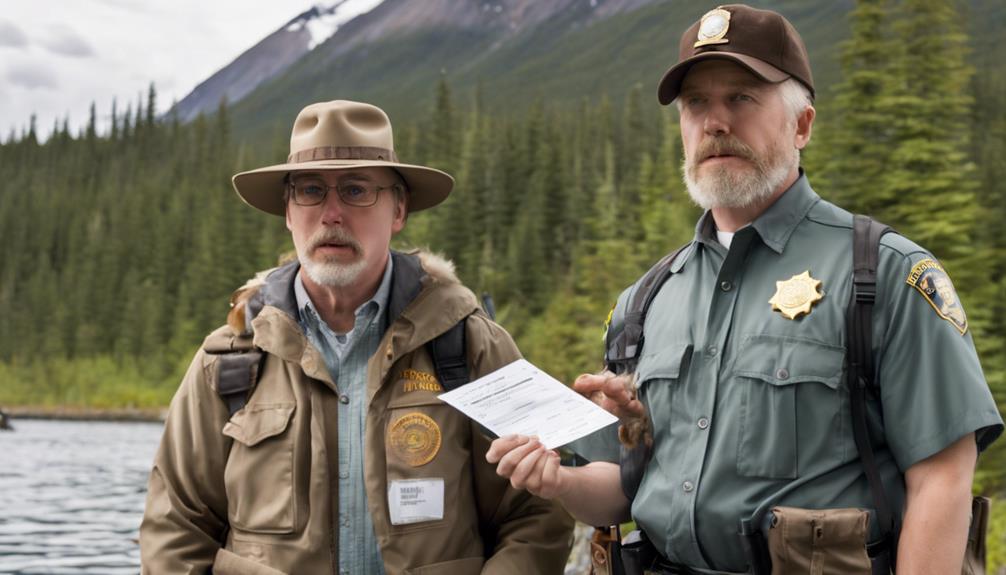
To ensure compliance with conservation efforts and wildlife preservation initiatives, penalties are imposed for fishing without a license in Alaska. Fishing without a license in Alaska can lead to various legal consequences, acting as deterrents to prevent this activity.
Public awareness and education play crucial roles in informing tourists and locals about the importance of obtaining a fishing license before engaging in fishing activities.
Here are three key points related to penalties for fishing without a license in Alaska:
- Legal Consequences: Fishing without a license in Alaska is considered a violation of state regulations. Those caught fishing without a license may face fines, confiscation of fishing equipment, and even potential court appearances. These legal consequences serve as a deterrent to ensure that individuals comply with the necessary licensing requirements.
- Deterrents: The enforcement of penalties for fishing without a license serves as a deterrent to prevent individuals from engaging in illegal fishing practices. By highlighting the consequences of not having a license, authorities aim to discourage such activities and promote responsible fishing practices among tourists and locals.
- Public Awareness, Education: Increasing public awareness and providing education about the importance of fishing licenses are essential in preventing violations. Through outreach programs, signs at fishing locations, and online resources, individuals can learn about the regulations in place and understand the significance of obtaining a license before fishing in Alaskan waters.
Tips for Responsible Fishing in Alaska
When fishing in Alaska, it's essential to follow responsible practices to preserve the environment and wildlife. Responsible practices not only ensure the sustainability of fish populations but also contribute to the overall health of Alaska's ecosystems. As a tourist enjoying the beauty of Alaska's waters, you play a crucial role in maintaining the delicate balance of its marine life.
To engage in responsible fishing, consider practicing catch and release. This method involves releasing fish back into the water after catching them, allowing them to continue their natural life cycle. By doing so, you contribute to the conservation of fish populations and help maintain the ecological equilibrium of Alaska's waters.
Furthermore, to promote sustainable tourism, familiarize yourself with Alaska's fishing regulations. These rules are in place to protect vulnerable species and habitats. Adhering to size limits, bag limits, and seasonal restrictions demonstrates your commitment to responsible angling practices.
Always properly dispose of any waste generated while fishing. Whether it's leftover bait containers, fishing lines, or food wrappers, make sure to pack out all your trash. Leaving no trace ensures that Alaska's pristine waters remain unspoiled for future generations of anglers to enjoy.
Frequently Asked Questions
Can Tourists Purchase Temporary Fishing Licenses in Alaska?
Yes, tourists can purchase temporary fishing licenses in Alaska. These licenses are essential to comply with local fishing regulations. Make sure to obtain your temporary license before heading out to enjoy a day of fishing in this beautiful state.
It's a straightforward process that ensures you're fishing legally and responsibly. Remember, following the rules not only keeps you out of trouble but also helps preserve Alaska's natural resources for future generations.
Are There Any Age Restrictions for Obtaining a Fishing License in Alaska?
To get a fishing license in Alaska, there are age restrictions in place. You must meet the minimum age requirement to obtain a license. When planning family fishing trips, make sure all participants meet the age regulations for licensing.
This ensures everyone can legally enjoy fishing in Alaska's waters. Remember to check the specific age restrictions and requirements before heading out on your fishing adventure.
Do Fishing Licenses in Alaska Have a Specific Expiration Date?
When fishing in Alaska, your fishing license has a specific expiration date. It's essential to keep track of when your license needs renewal.
Make sure to fulfill all the requirements and be aware of the fishing regulations during the license validity period. Stay informed to enjoy your fishing adventures without any issues.
Keep an eye on the expiration date to continue fishing legally in Alaska.
Are There Any Specific Areas or Rivers Where Tourists Are Not Allowed to Fish Even With a Valid License?
When you're fishing in Alaska, it's crucial to respect restricted areas to support conservation efforts. Even with a valid license, certain rivers and spots have regulations in place to safeguard the environment.
Make sure to check local guidelines and maps before casting your line to ensure you're not fishing in prohibited locations. By following these rules, you can contribute to the protection of Alaska's precious natural resources.
Can Tourists Use Their Out-Of-State Fishing Licenses in Alaska?
You can't use out-of-state fishing licenses in Alaska. Fishing regulations in Alaska require tourists to have a valid Alaska fishing license.
License requirements vary for residents and non-residents, with different fees and durations. Make sure to obtain the correct license before casting your line in Alaska's waters to avoid any fines or penalties.
Enjoy your fishing adventures responsibly by following the local regulations.
Conclusion
So, next time you're planning a fishing trip in Alaska, remember to get your fishing license.
It's not just a piece of paper, it's a way to support conservation efforts and ensure the sustainability of the area's fish populations.
Plus, it's a legal requirement that helps maintain the integrity of the sport.
So, make sure you have your license in hand before you cast your line and enjoy the stunning beauty of Alaska's waters responsibly.
